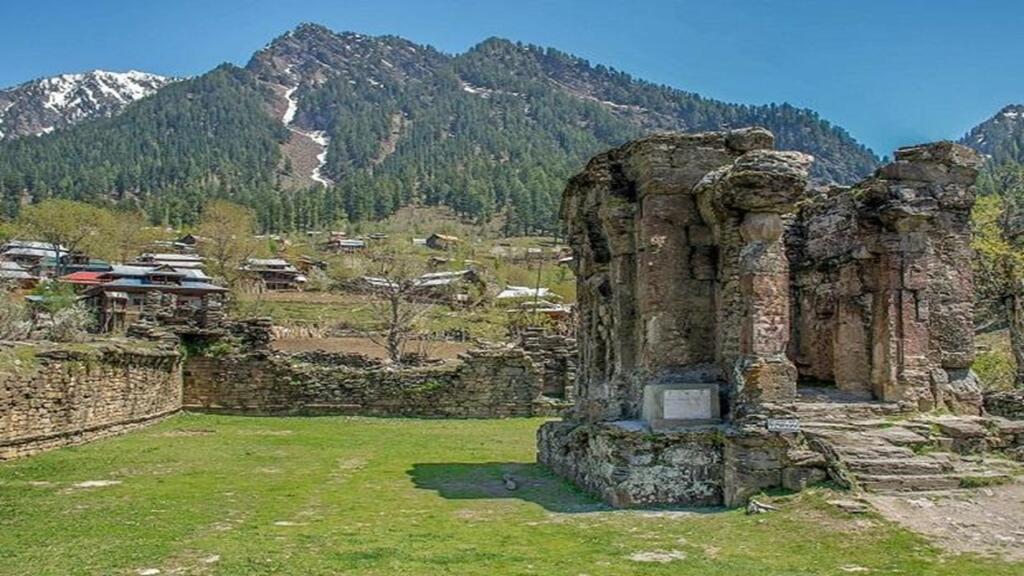United Kashmir is an integral part of the country. But after October 1947, the western part of Kashmir was taken over by Pakistan. This was not just a piece of land that Pakistan occupied; there were many other aspects, ranging from cultural to religious, that were hurt. So, India always believed that once it took that part of ours back, it would unite Kashmir. But for now, Union Home Minister Amit Shah has given some good news for Hindus regarding the Sharda Peeth, which is currently in POK.
Sharda Peeth History
The proposed Sharda Peeth corridor in Pakistan-occupied Kashmir (PoK) has been a long-standing demand of the Kashmiri Pandit community, who have sought to visit this ancient Hindu temple for many years. The temple is dedicated to the Hindu goddess of learning, and it is believed to have been established during the reign of Ashoka in 237 BC. Over the centuries, Sharda Peeth became one of the foremost centres of learning in the Indian subcontinent, with scholars coming from all over to study and teach there.
However, the temple was abandoned during the 12th century, and its ruins lay hidden for many centuries until they were rediscovered in the 19th century. Today, the temple is located in the Neelam Valley of PoK, on the banks of the Kishanganga River, which marks the Line of Control (LoC) between India and Pakistan. Despite its ruined state, the temple still holds great significance for the Kashmiri Pandit community, which regards it as one of their holiest sites.
Amit Shah announces the Sharda Peeth corridor
Union Home Minister Amit Shah, during the virtual inauguration of the Sharda Devi temple at Teetwal in Kupwara district, announced the Sharda Peeth Corridor. The announcement of the Sharda Peeth corridor comes at a time when relations between India and Pakistan are at a low point. In 2019, India abrogated Article 370 of the Constitution, which had granted special status to the former state of Jammu and Kashmir, and divided it into two Union Territories. This move was seen as a significant blow to Pakistan’s claim to the region, and it led to a sharp deterioration in relations between the two countries. Since then, India and Pakistan have largely cut off diplomatic ties and engaged in sporadic skirmishes along the LoC.
The opening of the Kartarpur Corridor in November 2019 was seen as a rare moment of cooperation between the two countries. The corridor connects the Darbar Sahib shrine in Kartarpur, Pakistan, with the Dera Baba Nanak shrine in Gurdaspur district, India, and allows Sikh pilgrims to visit the site where Guru Nanak Dev, the founder of Sikhism, spent his final years. The Kartarpur Corridor was hailed as a sign of hope for improved relations between India and Pakistan, but it did not lead to any significant breakthroughs in the broader bilateral relationship.
The corridor can ease tensions
The proposed Sharda Peeth corridor could be a similarly significant step towards easing tensions between the two countries. The corridor would allow Hindu pilgrims to visit the temple without having to cross the Line of Control, which has been a significant obstacle for many years. However, the proposed corridor is likely to face significant logistical and security challenges, given its location in PoK, which is controlled by Pakistan.
Pakistan has not yet responded officially to the Indian government’s proposal for the Sharda Peeth corridor. But reportedly, political activists in Pakistan-occupied Kashmir are happy with the proposal. The United Kashmir People’s National Party (UKPNP), led by Jamil Maqsood, Central Secretary for Foreign Affairs Committee, lauded India’s plan to open the Sharda Peeth Corridor in Pakistan-occupied Kashmir.
Support TFI:
Support us to strengthen the ‘Right’ ideology of cultural nationalism by purchasing the best quality garments from TFI-STORE.COM
